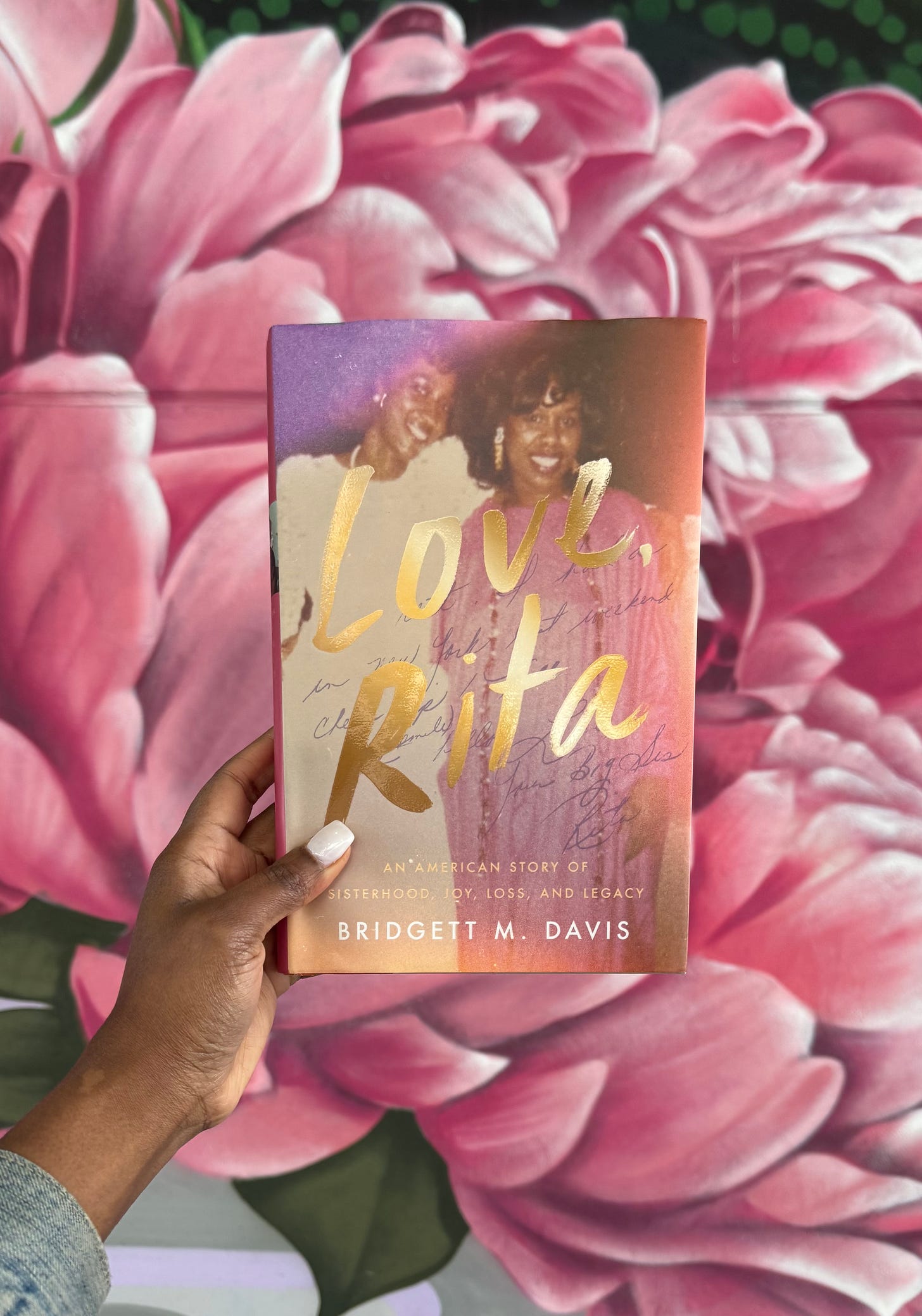Love, Rita: An American Story of Sisterhood, Joy, Loss, and Legacy
A heartfelt tribute by acclaimed writer, Bridgett M. Davis.
This book was gifted to me by the Harper Perennial Influencer Program. Thank you, Zaynah Ahmed, for sending it my way!
In Love, Rita,
captures the evolution of her relationship with her sister from childhood sibling rivalry to best friends in adulthood. In reality, two stories are being told. On the surface, there’s the telling of Rita's life as a sister, daughter, aunt, and friend—both familiar in her love for long phone conversations and dressing up, yet entirely her own as she enters college at 16 and later works as a car test driver. The author adds another layer to this story by placing Rita’s life and battle with lupus into context through weathering - a premature decline in health and accelerated aging within marginalized communities. When stress constantly taxes the body, people end up paying with their lives, and what unfolds is a gripping account that finds the author the sole survivor of her seven-person family of origin at the age of 40.What makes this book so spectacular is Davis’s ability to reveal how unsurprising her family’s outcomes truly are. She transforms the raw facts of Rita’s existence and weaves it into the fabric of America, demonstrating how a single life fits into the history of a nation. To tell the story of Rita, she provides a panoramic view of her family’s history, drawing clear intersections between her big sister’s lived experience and structural racism through topics like generational trauma, housing discrimination, and medical bias. Davis’s approach to family history is scholarly - a clear tribute to her journalist background. Using books, podcasts, peer-reviewed articles, interviews, court documents, diary entries, and family photos, she paints a masterful portrait of how systemic injustices, though heartbreaking, are anything but unexpected1. She highlights the power and limitations of science and the numbers behind statistics.
The chapters move quickly, with the author posing many questions—much like life itself. Love, Rita comes across as both a tribute and an act of external processing, capturing the tension of trying to make sense of another’s life when they are no longer present to fill in the blanks. It’s a piecing together of what happened nearly a quarter of a century earlier. The filling of space where a warm body once was. A search for answers where disease and death often leave none.
Yet, beneath the intimate grief, there is something larger at play. At times, I felt as if I were standing in a town square, watching a public execution—an undertaker draped in red, white, and blue. Each line of this touching prose kept circling back to a question it awakened in me: Where does the Black body find safety? While filled with anecdotes of joy within sibling relations and familial dynamics, an undercurrent of constant vigilance is prevalent within the Black experience. There’s friction between the predatory nature with which communities of color are both preyed upon and neglected. And yet, within this struggle, there is also resilience. The surrounding community, family, friends, and distant relatives come together, creating a patchwork of support that buoys the narrative. This is as much a story of systemic cruelty as it is a testament to collective care. Showing up for one another through letters, calls, and visits is a powerful force that sustains.
This memoir begins and ends with communication between the sisters. It opens with Rita speaking directly to Bridgett and ends with Bridgett writing to Rita after her passing. Love, Rita is a devotional bound in hardcover, illustrating nothing lost is beyond reach. It picks up from where life ended, but love did not. This is evident from the beginning, in the two quotes by James Baldwin and Emily Dickinson chosen as an epigraph. Their words communicate what Davis immortalizes in this text: Life, regardless of the results, matters, and love is eternal.
Love, Rita is just over 350 pages long, yet from the very first paragraph, it’s engaging and effortless. Each chapter unveils more of the author’s raw and poignant storytelling, and by the fourth section, I found myself unable to put it down, finishing the book in one sitting. While I haven’t read other titles by Bridgett M. Davis yet, this memoir has left me eager to explore more of her work. Her ability to intertwine personal history with larger societal narratives is remarkable, and I look forward to discovering what she shares next.
Bridgett M. Davis shares many references throughout Love, Rita. I compiled a reference list based on what I could identify and grasp.





Thank you for the care and tenderness you pour into this review. You’ve beautifully captured my intent. And now I will be quoting you: “Where does the Black body find safety?” Indeed.
Thanks for sharing your review of Love Rita with us. Your detailed choice of words to vividly paint snippets of what awaits the reader within the pages have me entranced. I am looking forward to making time to be mesmerized by Love Rita.